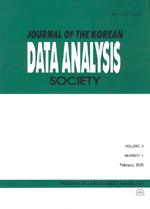중소기업을 위한 효율적인 부도예측모형 구축을 위한 연구
A Study of Effective Default Forecasting Model Development for Small and Medium Sized Enterprises
- 한국자료분석학회
- Journal of The Korean Data Analysis Society (JKDAS)
- Vol.11 No.3
-
2009.061363 - 1375 (13 pages)
- 49

부도예측모형을 구축하는 기본적인 요소는 모형에 사용할 충분한 데이터의 수집, 설명력이 높은 변수의 선택, 그리고 모형의 설계로 요약될 수 있다. 우리나라 중소규모 기업을 대상으로 하는 부도예측 모형을 구축하고자 할 때 부도 기업의 경우 충분한 자료의 확보가 어렵고 결측치나 특이치에 의한 정보의 손실이 발생할 수 있다. 본 논문에서는 이러한 문제점을 해결하기 위하여 로지스틱 회귀모형을 이용한 중소기업 부도예측모형을 설계함에 있어 데이터의 정제(data cleansing)와 대체(imputation)에 의한 데이터 통제방법과 확보된 표본 자료를 기초로 다양한 표본 자료 기간선택 방법 및 변수선택 방법을 비교하였다. 그 결과 데이터를 통제하는 경우가 그렇지 않은 경우보다 훨씬 향상된 성능을 보였으며, 여러 가지 변수선택 결과를 비교 분석함으로써 가장 좋은 성능을 보여주는 변수 조합을 찾을 수 있었다. 그리고 과거자료의 선택 기간에 따른 최적의 기간을 설정할 수 있었다.
The basic factors for developing of default forecasting model are sufficient number of data, selection of highly explanatory variable, and model construction. The small and medium sized enterprises in Korea don’t have enough data and may have loss of information by an outlier or missing data. To solve these problem in the area of the design of default forecasting model for the small and medium sized enterprises using logistic regression model, We proposed the data controlling method using data cleaning and imputation. Also we proposed the selection methods of sample data period and variable based on the collected data. As a data analysis results, we can see that usage of controlled data have better results than not controlled and we can find the optimal variable clusters using comparing among several variable selection results. We could also find an optimal data period to compare between the data periods.
1. 서론
2. 데이터 통제
3. 부도예측모형 설계
4. 중소기업 자료를 이용한 부도예측 모형의 적용
5. 결론
참고문헌
(0)
(0)